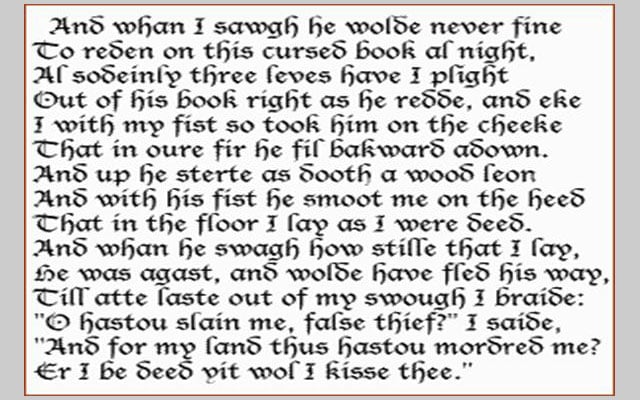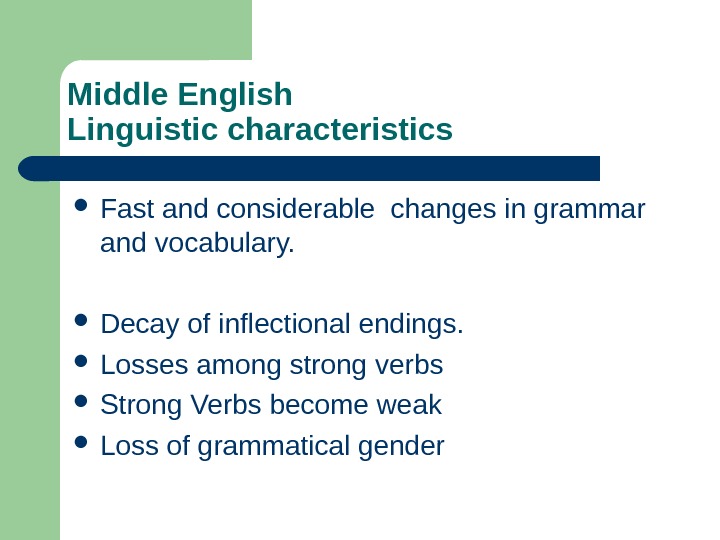The event that began the transition from Old English to Middle English was the Norman Conquest of 1066, when William the Conqueror (Duke of Normandy and, later, William I of England) invaded the island of Britain from his home base in northern France, and settled in. Great book, it is the ultimate guide for those wanting to learn Middle English. It includes many different portions of Middle English texts ranging across England showing the different dialects and the change throughout the Middle English Period. These range from the Petrborough Chronicle to Chaucer’s works.
| Norman Conquest | Back to Top |
| IMAGE |
William the Conqueror (from Bayeux Tapestry) (from History of Information) |
The conquering Normans were themselves descended from Vikings who had settled in northern France about 200 years before (the very word Norman comes originally from Norseman). However, they had completely abandoned their Old Norse language and wholeheartedly adopted French (which is a so-called Romance language, derived originally from the Latin, not Germanic, branch of Indo-European), to the extent that not a single Norse word survived in Normandy.
However, the Normans spoke a rural dialect of French with considerable Germanic influences, usually called Anglo-Norman or Norman French, which was quite different from the standard French of Paris of the period, which is known as Francien. The differences between these dialects became even more marked after the Norman invasion of Britain, particularly after King John and England lost the French part of Normandy to the King of France in 1204 and England became even more isolated from continental Europe.
Anglo-Norman French became the language of the kings and nobility of England for more than 300 years (Henry IV, who came to the English throne in 1399, was the first monarch since before the Conquest to have English as his mother tongue). While Anglo-Norman was the verbal language of the court, administration and culture, though, Latin was mostly used for written language, especially by the Church and in official records. For example, the “Domesday Book”, in which William the Conqueror took stock of his new kingdom, was written in Latin to emphasize its legal authority.
However, the peasantry and lower classes (the vast majority of the population, an estimated 95%) continued to speak English - considered by the Normans a low-class, vulgar tongue - and the two languages developed in parallel, only gradually merging as Normans and Anglo-Saxons began to intermarry. It is this mixture of Old English and Anglo-Norman that is usually referred to as Middle English.
•Middle English Dictionary
Middle English Words
•Corpus of Middle Englishprose and verse
•Concise Dictionary of Middle English (from 1150 to 1580) by Anthony Mayhew & Walter Skeat (1888) or text version
•Middle English dictionary (12th-15th century) by Francis Henry Stratmann & Henry Bradley (1891)
•Catholicon Anglicum, an English-Latin wordbook dated 1483, edited by Sidney Herrtage (1881)
•Middle English names of merchants : etymology and aspects of usage, by Oxana Dobrovolska, in Skase (2016)
•Langue et nationen Angleterre à la fin du Moyen Âge, by Christopher Fletcher, in Revue française d'histoire des idées politiques (2012)

•Elementary Middle English grammar by Joseph Wright (1923)

•Historical outlines of English sounds and Middle English grammar by Samuel Moore (1919)
•Observations on the language of Chaucer's Troilus by George Lyman Kittredge (1902)
•An anthology of Medieval English popular literature: 'Make we merry more and less', by ouvrage dirigé par Jane Bliss & Douglas Gray (2019)
•Le bien commun dans la littérature anglaisede la fin du Moyen Âge, by Aude Mairey, in Revue française d'histoire des idées politiques (2010)
•Poésie et politiquedans l'Angleterre de la fin du Moyen Âge : le cas du parlement (2007)
•Qu'est-ce que le peuple ?quelques réflexions sur la littérature politique anglaise à la fin du Moyen Âge, in Médiévales (2009)
•15th century prose and verse by Alfred Pollard (1903)
•Specimens of Early Englishwith introduction, notes and glossary index, by Richard Morris & Walter Skeat (1887): I (1150-1300) & II (1298-1393)
•Selections from Early Middle English, 1130-1250, with introductions & notes, by Joseph Hall (1920)

•First Middle English primer, extracts from the Ancren riwle and Ormulum, with grammar, notes and glossary, by Henry Sweet (1909)
•Second Middle English primer, extracts from Chaucer, with grammar and glossary, by Henry Sweet (1905)
•An Old and Middle English reader by George Edwin MacLean, on the basis of Julius Zupitza's book (1893)
Middle English Translators
•Alt- und mittelenglisches Übungsbuch with dictionary, by Julius Zuspitza & Jakob Schipper (1915)
Middle English Wikipedia
•King Horn, a Middle-English romance, by Joseph Hall (1901)
Middle English Hy
→Bible in English: John Wycliffe's translation (1395)
→Old English - Anglo-Norman - Early Modern English- Late Modern English
→Bible in English
→United Kingdom - England: maps & documents
